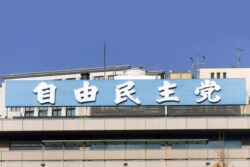
A worker updates fuel prices at a gas station in Curitiba, Brazil, on Thursday.
13:09 JST, March 11, 2022
Russia’s invasion of Ukraine has cast a shadow over the outlook for the global economy. As both countries are major exporters of natural resources and food, the turmoil caused by the invasion has thrown supply and demand out of kilter, bringing about price increases around the world.
With antagonism between Russia and the West expected to continue over an extended period, fears of stagflation — meaning high inflation combined with stagnant economic output — have emerged.
A serious blow
“With energy and food prices set to remain high, the situation of tightened purse strings will continue.” Conspicuous in the Economy Watchers Survey for February, released Tuesday by the Cabinet Office, were voices of concern that soaring energy prices caused by Russia’s military aggression in Ukraine would spill over into Japan’s domestic economy.
Crude oil prices continue to skyrocket, pulling the prices of gasoline, electricity and more along with them. As Russia is one of the world’s largest producers of crude oil and natural gas, concern over the outlook for its supply will have a huge impact on energy prices.
Price increases have also hit various commodities including wheat. Both Russia and Ukraine are major wheat producers, together accounting for about 30% of international exports of the grain.
Even before Russia’s military aggression, energy and commodity prices had been rising on global markets, impacted by a labor shortage amid recovery from the effects of the COVID-19 pandemic. The Ukrainian crisis, which occurred at such a juncture, has further stoked the already soaring prices of goods.
The International Monetary Fund noted in a statement issued on March 5, “The ongoing war and associated sanctions will also have a severe impact on the global economy.”
To exhaust the Russian economy, the United States, European countries and Japan have imposed severe economic sanctions on Russia, such as excluding some Russian banks from international financial transactions. Yet, the sanctions are reckoned to generate a “backlash” through soaring prices on commodities markets, thus weighing down the global economy.
According to a report by Osamu Tanaka, a chief economist at Dai-Ichi Life Research Institute Inc., if exports to Russia and Ukraine decline by 20%, and crude oil prices hover around an average of $100 per barrel this year, economic growth in Europe will be reduced by 0.4 percentage points, and that in Japan by 0.3 percentage points. Although the impact on the U.S. economy is expected to be less significant, consumption in the United States is likely to slow if prices rise sharply.
In a dilemma
To curb inflation, central banks in many countries plan to implement tight monetary policy. The Bank of England has already raised interest rates, and the U.S. Federal Reserve Board is expected to do so as well at its meeting slated for March 15-16.
But a tight-money policy is also expected to have serious side effects. Generally speaking, higher interest rates will raise the cost of borrowing, thus dampening the overall economy.
As many of them move to managing their funds in U.S. dollars, a likely effect will be a shift in international flows of money, draining capital away from emerging countries and elsewhere. Central banks of various countries will be hard-pressed to manage their monetary policy.
The end of the Cold War and economic globalization had led to a horizontal division of labor, holding price increases in check.
However, in light of the U.S.-China conflict in recent years, now coupled with the Ukrainian crisis, there is a growing possibility that the global economy can be hit by inflation and even stagflation, thus becoming increasingly unstable.
Hosei University Prof. Akio Makabe notes, “Countries will pull even further into separate economic blocs, thus stagnating the global economy.”
Top Articles in Business
-

Prudential Life Insurance Plans to Fully Compensate for Damages Caused by Fraudulent Actions Without Waiting for Third-Party Committee Review
-

Narita Airport, Startup in Japan Demonstrate Machine to Compress Clothes for Tourists to Prevent People from Abandoning Suitcases
-

JR Tokai, Shizuoka Pref. Agree on Water Resources for Maglev Train Construction
-

Toyota Motor Group Firm to Sell Clean Energy Greenhouses for Strawberries
-

Japan, U.S. Name 3 Inaugural Investment Projects; Reached Agreement After Considerable Difficulty
JN ACCESS RANKING
-

Japan PM Takaichi’s Cabinet Resigns en Masse
-

Japan Institute to Use Domestic Commercial Optical Lattice Clock to Set Japan Standard Time
-

Israeli Ambassador to Japan Speaks about Japan’s Role in the Reconstruction of Gaza
-

Man Infected with Measles Reportedly Dined at Restaurant in Tokyo Station
-

Videos Plagiarized, Reposted with False Subtitles Claiming ‘Ryukyu Belongs to China’; Anti-China False Information Also Posted in Japan























